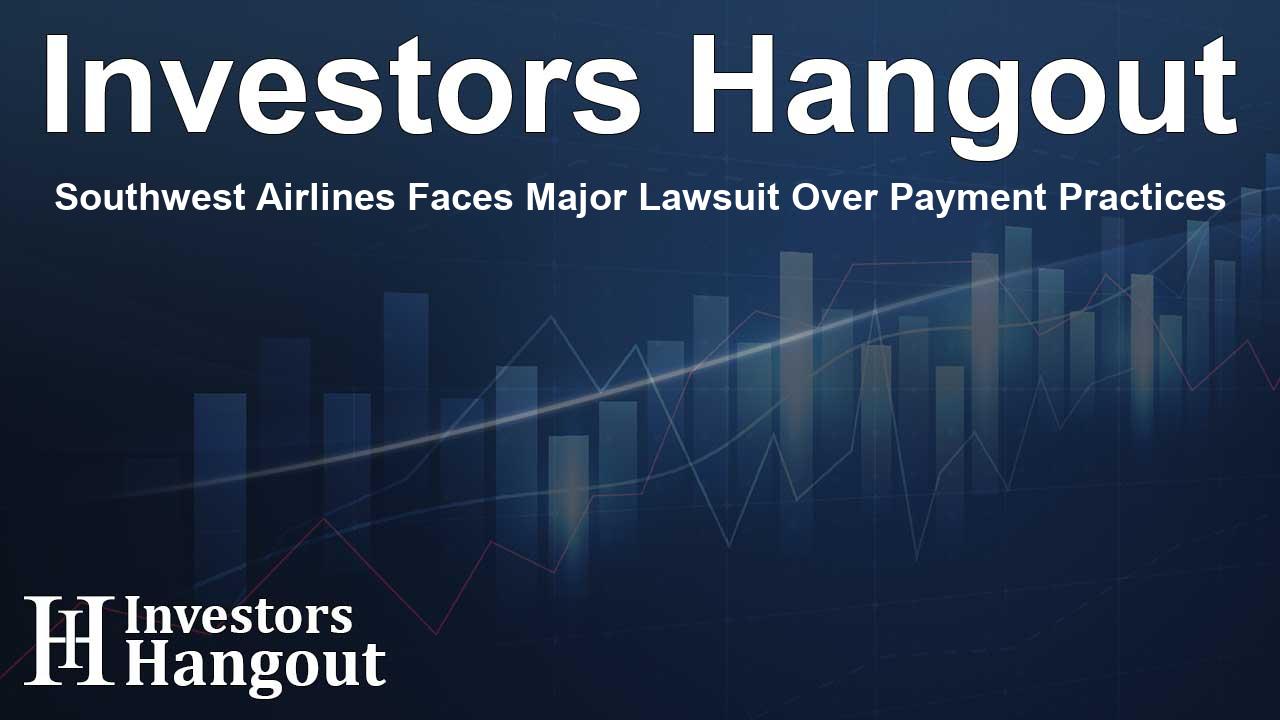Southwest Airlines Faces Major Lawsuit Over Payment Practices

Southwest Airlines Hit by Lawsuit for Wage Violations
With claims of low fares, Southwest Airlines is now facing serious allegations regarding its treatment of workers in New York State. A recently filed lawsuit reveals that the airline has denied manual workers their entitlement to weekly paychecks, violating clear provisions in New York state law.
Details of the Lawsuit
This lawsuit, seeking a staggering $100 million in damages, was brought forward by employees of Southwest Airlines, specifically aimed at addressing wage violations affecting baggage and cargo handlers.
Who Is Representing the Plaintiffs?
The legal team representing the workers includes attorneys from Sanford Heisler Sharp McKnight, who filed the case in the U.S. District Court for the Eastern District of New York. The named plaintiffs, Richard Strain and David Garner, have stood up not just for themselves but for a broader group of employees facing similar issues.
Legal Context of the Allegations
According to New York Labor Law (NYLL), manual workers are required to be paid weekly. However, Southwest apparently compensates its baggage and cargo handlers bi-monthly instead, which runs contrary to these regulations. Michael Palmer, representing the plaintiffs, emphasized that this practice is damaging to workers who rely on regular paychecks to meet their everyday needs.
Federal Laws Involved
The lawsuit also brings the Fair Labor Standards Act (FLSA) into play, which shares similar requirements for timely payments. Disputes regarding payment practices under both state and federal laws have been examined in courts within the Second Circuit, which underscores the seriousness of these claims.
Monetary Claims and Sought Compensation
The plaintiffs are pursuing monetary compensation for damages endured by Strain, Garner, and other workers employed by Southwest Airlines. These claims can potentially encompass workers from 2018 until the resolution of the case.
The Plaintiffs' Profiles
Both plaintiffs, Strain and Garner, are long-term residents of New York, with Strain working since 2008 and Garner since 2009 in roles that include loading and unloading baggage.
Current Operations and Financial Standing of Southwest Airlines
Headquartered in Dallas, Texas, Southwest Airlines has a strong presence in New York, operating in major airports. Recent reports indicate record operating revenues for the airline, which adds an interesting dimension to the lawsuit regarding how funds may be allocated in relation to worker compensation.
Qualifications of the Represented Class
The lawsuit asserts that there are over 100 members in the plaintiff class, all of whom have worked or currently work as manual workers in New York. The nature of their roles certifies them as manual workers under the NYLL.
Impact on Workers
Southwest's alleged failure to pay these workers weekly can lead to severe financial burdens, as many depend on these wages to cover essential costs such as rent and food. By withholding the money they are owed, workers are effectively deprived of resources necessary for daily survival.
Legal Proceedings Ahead
As part of the lawsuit, the plaintiffs are requesting a jury trial. They are also asking for a declaration that Southwest Airlines’ current pay practices are unlawful under both the NYLL and FLSA.
Potential Outcomes
If successful, this lawsuit could not only result in significant financial compensation for the plaintiffs but may also force Southwest Airlines to alter its wage practices. This could ensure fair treatment and timeliness in wage payments for all employees.
Conclusion: Wider Ramifications
The outcome of this legal challenge can echo across the industry, prompting a review of payment practices that could benefit a broad spectrum of workers, ensuring that their rights are respected.
Frequently Asked Questions
What is the lawsuit against Southwest Airlines about?
The lawsuit addresses Southwest Airlines' violation of wage laws by not paying manual workers weekly as required by New York Labor Law.
How much money is being sought in damages?
The plaintiffs are seeking $100 million in damages for the alleged wage violations.
Who are the plaintiffs in the case?
The plaintiffs are Richard Strain and David Garner, along with other employees who have faced similar payment issues at Southwest Airlines.
How does this lawsuit relate to federal law?
The case invokes the Fair Labor Standards Act, which requires timely payment of wages, similar to the New York Labor Law.
What might happen if the plaintiffs win?
If the plaintiffs succeed, it could lead to significant compensation and require Southwest Airlines to revise its wage practices to comply with the law.
About Investors Hangout
Investors Hangout is a leading online stock forum for financial discussion and learning, offering a wide range of free tools and resources. It draws in traders of all levels, who exchange market knowledge, investigate trading tactics, and keep an eye on industry developments in real time. Featuring financial articles, stock message boards, quotes, charts, company profiles, and live news updates. Through cooperative learning and a wealth of informational resources, it helps users from novices creating their first portfolios to experts honing their techniques. Join Investors Hangout today: https://investorshangout.com/
Disclaimer: The content of this article is solely for general informational purposes only; it does not represent legal, financial, or investment advice. Investors Hangout does not offer financial advice; the author is not a licensed financial advisor. Consult a qualified advisor before making any financial or investment decisions based on this article. The author's interpretation of publicly available data shapes the opinions presented here; as a result, they should not be taken as advice to purchase, sell, or hold any securities mentioned or any other investments. The author does not guarantee the accuracy, completeness, or timeliness of any material, providing it "as is." Information and market conditions may change; past performance is not indicative of future outcomes. If any of the material offered here is inaccurate, please contact us for corrections.